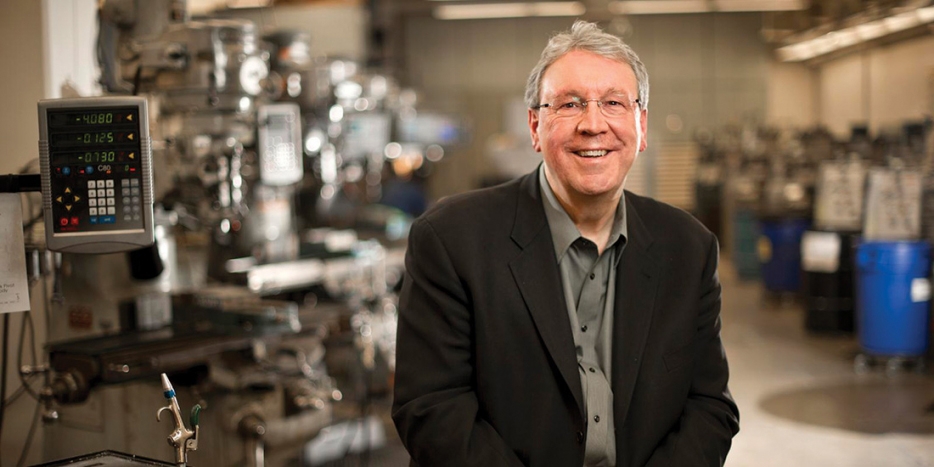David A. Dornfeld, manufacturing expert, dies of a heart attack
David A. Dornfeld, manufacturing expert, dies of a heart attack
David A. Dornfeld, mechanical engineering professor, founding faculty director of the Jacobs Institute for Design Innovation and a leader at the College of Engineering, died of a heart attack on March 27. He was 66. Dornfeld was a renowned manufacturing expert, widely admired as a teacher and well-regarded as a thoughtful leader.

David A. Dornfeld, mechanical engineering professor, founding faculty director of the Jacobs Institute for Design Innovation and a leader at the College of Engineering, died of a heart attack on March 27. He was 66. Dornfeld was a renowned manufacturing expert, widely admired as a teacher and well-regarded as a thoughtful leader.
His contributions to the fields of precision and sustainable manufacturing and engineering design education are only part of his durable legacy. As a faculty member at Berkeley, he mentored 55 Ph.D. students, many of whom have gone on to become leaders in academia and industry. He consulted and advised countless other graduate students and, most recently, became a champion for undergraduate research opportunities through his position at the Jacobs Institute.
"We remember Dave as an advocate for our students and as a powerful force for good," said S. Shankar Sastry, dean and Carlson professor of engineering at Berkeley. "I still remember fondly how we all worked together to put together a College Robotics, Automation and Manufacturing Program in the mid-1980s. Most recently, it was a real pleasure working with him on President Obama's Advanced Manufacturing Partnership, where we provided recommendations to advance the emerging areas of sustainable manufacturing and cyber-manufacturing."
Dornfeld was born in Horicon, Wisconsin in 1949. Growing up, he and his brother, William, would accompany their father, who worked at John Deere, to the factory floor. Years later, Dornfeld attended the University of Wisconsin, where he met his future wife, Barbara, and where he stayed for graduate school. The boy who watched the assembly of tractors with his dad and brother eventually wrote his Ph.D. dissertation on the use of abrasive machining in production engineering.
In 1977, Dornfeld accepted an assistant professor position at Berkeley in mechanical engineering, the department he would someday lead. One of the first students Dornfeld advised was Roberto Horowitz, the mechanical engineering department's current chair. "Dave's leadership was marked by common sense, humility and well-timed moments of humor," Horowitz said. "He was a genuinely good-hearted person, who always found the means of putting everyone at ease. He was able to direct discussions in the most positive direction, no matter how difficult an issue."
By 1982, Dornfeld was emerging as a leader both on campus and beyond. That year he won an award from the Society of Manufacturing Engineers, recognizing outstanding work by a young engineer in the field. Dornfeld's early research focused on automated welding. In 1986, he, along with mechanical engineering professor Masayoshi Tomizuka, organized a symposium in Japan called the Japan USA Symposium on Flexible Manufacturing, which continues biannually to this day.
During the 1980s, Dornfeld continued to collaborate with his engineering colleagues across the college on automating manufacturing processes, which led to the founding of Berkeley Engineering's Robotics, Automation and Manufacturing Program (RAMP).
In 1989, Dornfeld was recognized for his teaching, winning the Pi Tau Sigma Excellence in Teaching Award. "Whenever I visited his office, he almost always had a notebook and a fountain pen with green ink ready to jot down my thoughts," said former student Yoon Lee, currently a senior vice president at Samsung Electronics America. "Twenty years later, when I visited his office at the Jacobs Institute, the only difference was that the ink was blue instead of green. He was a great teacher and mentor."
Also in 1989, Dornfeld became a full professor of manufacturing engineering and was appointed the director of Berkeley's Engineering Systems Research Center, a position he held for a decade.
Over the next two years, he was awarded four patents related to his research on acoustic emissions measurements, a method of using sound to monitor the status of manufacturing processes in wood composites, metal and plastic.
During the 1990s, Dornfeld began researching chemical-mechanical planarization (CMP), a hybrid process of chemical etching and abrasive polishing used in high-precision semiconductor and microelectromechanical systems manufacturing. In the mid-2000s, Dornfeld obtained three patents relating to CMP.
Dornfeld was named the Will C. Hall Family Professor of Engineering in 1999, and from 2001 until 2008, he was the college's associate dean of interdisciplinary studies. In 2005, Dornfeld was appointed the special division deputy for the Engineering Division at the Berkeley Lab.
During the mid-2000s, Dornfeld founded the Laboratory for Manufacturing and Sustainability. "His laboratory was a hub for constant innovation in manufacturing research and education that spanned worldwide interests such as data analytics for smart manufacturing, manufacturing technologies for emerging economies, artificial photosynthesis and design for sustainability, to name a few," Horowitz said.
Dornfeld's lab was also inclusive. "Students would look at the work that he did, and they would find him. We have had an amazingly diverse group of students in our lab," said longtime lab manager Kathy Schermerhorn-Cousens, noting that at some lab meetings women would outnumber men.
"Dave Dornfeld was a wonderful mentor and advisor," said former student and sustainability consultant Nancy Diaz-Elsayed. "He created a research environment where his students weren't afraid to take risks and explore unconventional paths."
From 2010 until 2015, Dornfeld served as chair of the mechanical engineering department. During that time he was instrumental in representing the university as part of a $500-million initiative launched by President Barack Obama to bolster American manufacturing. The program, called the Advanced Manufacturing Partnership (AMP), was well-suited to Dornfeld's expertise, as it sought to convert university-based manufacturing research to technological solutions deployed by industry.
Over the course of his career, Dornfeld won numerous awards for his contributions to manufacturing research. He was a fellow of the American Society of Mechanical Engineers (ASME), receiving ASME's Ennor Award in 2010. He was also a fellow and past director of the Society of Manufacturing Engineers (SME), and in 2004, was awarded SME's Frederick W. Taylor Research Medal. He was named vice president of the International Academy for Production Engineering (CIRP) in August 2015. Other honors include the Takagi Prize, the Charles F. Carter Advancing Manufacturing Award and the M. Eugene Merchant Manufacturing Medal.
In 2013, he was elected to the National Academy of Engineering. A prolific scholar, he published 400 papers, wrote three research monographs and contributed several chapters to books. He was also the keeper of a long-running and engaging blog about green manufacturing. "He was able to communicate on complex issues in a very simple way that people could understand," Horowitz said.
Dornfeld was an astute leader. He was willing to listen and include various viewpoints in his decision-making. He was also an adept visionary. "I think he had a very good sense of what was becoming important in engineering manufacturing," Tomizuka said. "People were very confident in Dave's leadership abilities."
He was instrumental in founding the Jacobs Institute for Design Innovation on campus, a new model for engineering education that exposes undergraduates to the process of technological innovation, collaborative thinking, rapid prototyping, digital fabrication and business development. Dornfeld was chosen to lead the institute after an extensive international search.
Both personally and professionally, he was known for his warm and approachable personality. He is remembered for his sense of humor, which often defused contentious situations. He also loved outrageous socks, which he would exchange with another longtime colleague and collaborator, mechanical engineering professor Paul Wright. "After a few years of friendship we both settled into a realization that we enjoyed funky socks," Wright said. "So each time one of us was in Hong Kong, London or Paris, etc., we returned with a small surprise gift. 'Socks with flair' somehow captures our friendship. I miss him dearly, as do so many of our community here and around the world."
David Dornfeld, a friend and colleague of many, is survived by his wife, Barbara, and his brother, William. A campus memorial will be held in the coming months.
4/11/2016, by Daniel McGly





